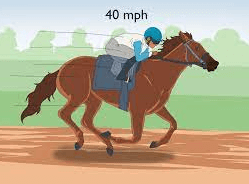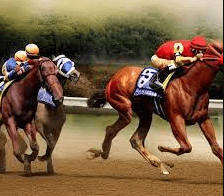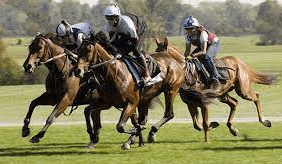How Can One Choose A Winning Horse In Thoroughbred Horse Racing?

Thoroughbred horse racing is a sport that combines the thrill of competition with the art of betting. For those who seek to choose a winning horse in these races, it requires a systematic approach that involves careful research, analysis of odds and form, as well as evaluation of track conditions and race distance.
By employing these strategies, individuals can increase their chances of making informed decisions and potentially achieving success in this captivating world.
To begin with, conducting thorough research is essential when aiming to choose a winning horse in thoroughbred horse racing. This involves studying past performances, analyzing statistics, and staying updated on the latest news about horses, trainers, jockeys, and track conditions. By examining factors such as previous race results, speed figures, class levels, and individual running styles of horses competing in upcoming races, one can gain valuable insights into their potential for success.
Furthermore, analyzing the odds and form of each horse is crucial for making informed betting decisions. Odds reflect the perceived probability of a horse winning or placing in a race based on public opinion. A keen understanding of how odds are calculated can help bettors identify opportunities where horses may be undervalued or overvalued by the betting public. Additionally, reviewing a horse’s recent form – including its performance in previous races – provides valuable information regarding its current fitness level and consistency.
In conclusion, choosing a winning horse in thoroughbred horse racing requires diligent research and analysis. By delving into past performances and considering various factors such as odds and form alongside evaluating track conditions and race distance accurately; individuals can make more informed decisions when placing bets. Ultimately though this process may seem daunting at first glance but developing knowledge about all aspects related to this exciting sport will provide individuals with greater freedom to enjoy both the experience of watching these magnificent animals compete while also having an opportunity for financial gain if luck favors them along the way.
Do Your Research
Conducting thorough research is essential in the process of selecting a winning horse in thoroughbred horse racing. To increase the chances of success, it is crucial to understand the horse’s breeding and study the jockey’s performance.
By examining the horse’s lineage and bloodlines, one can gain insights into its genetic potential and racing abilities. Factors such as stamina, speed, and track preference can be influenced by the horse’s breeding.
Additionally, studying the jockey’s performance can provide valuable information about their skill level, experience, and past successes. Analyzing factors such as win percentages, riding style, and their ability to handle different track conditions can help in making an informed decision when choosing a winning horse.
Therefore, investing time in researching these aspects can greatly enhance one’s chances of selecting a successful contender in thoroughbred horse racing.
Analyze the Odds and Form
Analyzing the odds and form is essential when making predictions in thoroughbred horse racing, as it provides valuable information on the potential performance of each competitor.
An interesting statistic to consider is that over the past decade, horses with odds between 2/1 and 5/1 have had a higher chance of finishing in the top three positions. This indicates that there may be value in betting on horses within this range.
To further enhance one’s analysis, it is important to study past performances of each horse. By examining their previous races, one can gain insights into their running style, consistency, and ability to handle different track conditions.
Additionally, studying jockey and trainer statistics can provide valuable information on their success rates and expertise in certain race types or distances. These factors can greatly influence a horse’s chances of winning or placing well in a race.
Therefore, by thoroughly analyzing the odds and form along with studying jockey and trainer statistics, bettors can make more informed decisions when selecting a winning horse in thoroughbred horse racing.
Evaluate Track Conditions and Race Distance
When evaluating track conditions and race distance in thoroughbred horse racing, there are several key points to consider.
Firstly, it is important to analyze the horse’s performance on different track surfaces. Certain horses may excel on firm or wet tracks, while others may struggle.
Additionally, assessing the horse’s ability to handle the race distance is crucial, as some horses may be better suited for shorter sprints while others thrive in longer races.
Lastly, taking weather conditions into account is essential, as changes in temperature and precipitation can greatly impact a horse’s performance.
By carefully evaluating these factors, bettors can make informed decisions when selecting a winning horse in thoroughbred racing.
Consider the Horse’s Performance on Different Track Surfaces
Considering the horse’s performance on different track surfaces is crucial when selecting a winning horse in thoroughbred horse racing.
The impact of jockey experience on horse performance cannot be underestimated, as skilled jockeys are often able to adapt their riding style to suit various track conditions, maximizing the horse’s potential. A jockey with extensive experience can make split-second decisions that may significantly influence the outcome of a race.
Additionally, the importance of pedigree in horse racing cannot be overlooked. Certain bloodlines have historically performed better on specific track surfaces, whether it be dirt, turf, or synthetic. Studying a horse’s lineage can provide valuable insights into its potential performance on different tracks.
Furthermore, analyzing past performances on specific track surfaces allows bettors to gauge how well a particular horse has adapted to different conditions in previous races and assess its suitability for future races.
Ultimately, considering these factors alongside other key variables such as form and class can enhance one’s chances of choosing a winning thoroughbred in horse racing.
Assess the Horse’s Ability to Handle the Race Distance
Examining the horse’s aptitude for tackling the race distance is paramount in determining its potential success.
Evaluating fitness and studying past performances are crucial factors in assessing a horse’s ability to handle the race distance. Fitness plays a vital role as it determines whether a horse has the stamina and endurance necessary to compete effectively.
Studying past performances allows one to analyze how a horse has performed at various distances, identifying patterns of success or struggles. This analysis provides valuable insights into whether a particular horse is better suited for shorter sprints or longer races.
Additionally, considering factors such as breeding, training methods, and jockey experience can contribute to evaluating a horse’s suitability for different race distances.
By carefully examining these aspects, bettors can make more informed decisions when selecting their winning horses in thoroughbred racing events.
Take Weather Conditions into Account
When assessing the horse’s ability to handle the race distance, it is important to also take into account the weather conditions.
Weather can have a significant impact on a horse’s performance and can greatly affect their chances of winning. The condition of the track, whether it is wet or dry, can determine how well a horse will be able to run.
Wet tracks can be more challenging for horses as they require more energy to navigate through the mud. On the other hand, dry tracks are generally faster and horses with good speed may have an advantage.
Additionally, extreme weather conditions such as heavy rain or strong winds can further impact a horse’s performance and should be considered when choosing a winning horse.
To make an informed decision, it is crucial to analyze how different weather conditions have affected previous race results and consider the impact of jockey’s experience in handling specific weather conditions.
Frequently Asked Questions
What are the different types of thoroughbred horse races?
There are various types of horse races in the thoroughbred industry, including flat racing, steeplechase, and handicap races. Each race has its own unique characteristics and requirements that determine the type of horse track and the specific event being held.
How do jockeys prepare for a race?
Jockeys undergo rigorous training techniques and race day preparations to maximize their performance. These include physical conditioning, studying the horse’s form and strategy, familiarizing themselves with the track, and maintaining a strong mental focus.
Is there a specific age range in which horses perform best?
The performance of thoroughbred horses can vary depending on their age. Research suggests that horses between the ages of three and five tend to perform at their best, with physical maturity and experience playing key roles in their racing abilities.
How do trainers determine which races are suitable for their horses?
Trainers’ race selection is influenced by various factors. These include the horse’s form, fitness, and ability, as well as the distance, surface, and class of the race. By considering these factors carefully, trainers aim to maximize their horses’ chances of success.
Are there any specific strategies or techniques that successful bettors use to choose winning horses?
Successful bettors in thoroughbred horse racing utilize various strategies and handicapping techniques to choose winning horses. These methods involve analyzing factors such as past performance, track conditions, jockey ability, and trainer records to make informed betting decisions.
Conclusion
In conclusion, selecting a winning horse in thoroughbred horse racing requires careful research, analysis of odds and form, as well as evaluation of track conditions and race distance. It is imperative to delve into the history and performance of each horse, examining their previous races and studying their pedigree. By doing so, one can gain valuable insights into the potential success of a particular horse.
Furthermore, analyzing the odds and form is crucial in determining the likelihood of a horse’s victory. Calculating probability based on the betting market can provide an indication of a horse’s perceived chances. Additionally, evaluating the recent performances and consistency of a horse can offer valuable information on its current form.
Moreover, taking into account track conditions and race distance is essential for making an informed decision. Certain horses may excel on specific surfaces or under certain weather conditions. Likewise, some horses may have better stamina for longer distances while others may perform better over shorter sprints.
Ultimately, choosing a winning horse involves combining knowledge with analytical thinking. It requires astute observation skills and attention to detail. As French philosopher Voltaire once said: ‘Chance favors only the prepared mind.’ This figure of speech reminds us that success in thoroughbred horse racing relies not solely on luck but rather on meticulous preparation and thoughtful consideration of various factors influencing a race outcome. With dedication to research, analysis, and evaluation, one can increase their chances of selecting a victorious steed in this exhilarating sport.



